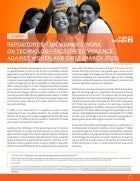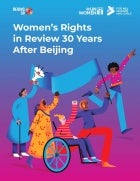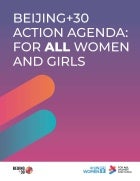Date:
This publication presents 54 promising practices from 24 UN entities of progress in gender mainstreaming towards the Beijing Platform for Action’s 12 critical areas of concern. These promising practices reflect the ways in which the UN system has advanced women’s and girls’ rights by strategically and comprehensively embedding gender perspectives across policies and programmes.
Engendering fiscal space: Modelling alternative methods of financing investments for gender equality
Date:
This paper models how diverse gender equality policies impact various metrics unevenly across social groups and macroeconomic indicators. It emphasizes that “what”, “for whom”, and, crucially, “how” policies are financed significantly affect distributional and macroeconomic outcomes. It introduces a policy model to assess interventions based on their objectives, target groups, and financing, aiming to illuminate their effects on economic performance and gender equality measures like employment and housework division.
Date:
This paper analyses how external debt, concessional finance, and special drawing rights (SDRs) impact fiscal space for gender equality amid the Global South’s debt crisis. It critiques traditional debt sustainability definitions, advocating for a feminist developmental approach. It proposes gender-responsive external finance tools, emphasizing multilateral action and political will to expand fiscal space for gender equality and a more equitable global economy.
Date:
This paper redefines fiscal space for gender equality investments beyond debt sustainability, emphasizing domestic resource mobilization and a supportive environment. It argues that gender equality spending is a long-term investment, stimulating growth and revenue, reducing inequality, and improving human development. Macro-level policies in care, credit, and infrastructure are crucial. Viewing such spending as productive, not discretionary, reveals its self-financing potential over time, addressing fiscal space concerns.
Date:
This paper offers a unified framework for increasing gender equality funding through macro policies and external finance. It explores government spending, taxation, monetary policies, and macroprudential tools. For developing countries, it highlights debt relief, concessional finance, and special drawing rights. The paper distinguishes direct and indirect policy impacts, emphasizing gender-responsive benchmarks and markers. It advocates for a broader understanding of fiscal space beyond debt, recognizing gender equality investments and leveraging diverse policy instruments.
Date:
This policy paper highlights how the 12 critical areas of concern from the Beijing Platform for Action have progressed or faced continuing entrenched barriers and dealt with new challenges in the 30 years since the United Nations’ Fourth World Conference on Women held in Beijing. The focus is specifically on how gender inequality and disability exclusion both compound and create unique concerns for women and girls with disabilities.
Date:
This compendium of case studies collected for the Beijing+30 review process examines lessons learned and good practices on gender, disability inclusion, and intersectionality. It aims to share reflections for UN entities, Member States, policymakers, and civil society organizations. It synthesizes best practices, innovative approaches, and collaborative efforts to enhance sustainable development and human rights for all.
Date:
This research paper interrogates the gap between the commitments by the United Nations and donors to increase funding for women’s organizations in conflict-affected countries, and the lower funding reportedly received by these organizations in recent years. It provides a more precise accounting of funding flows and explanations for why these pledges and commitments have not yet translated into more resources for women’s organizations at the frontline of crises.
Date:
This repository reflects UN Women’s work addressing a critical and growing form of violence that disproportionately affects women and girls worldwide: technology-facilitated violence against women and girls. The repository stands as a resource for policymakers, practitioners, and advocates, equipping them with the insights and tools needed to combat technology-facilitated violence and create a safer digital space for women and girls.
Date:
The “Women in politics: 2025” map illustrates the underrepresentation of women in executive positions and parliaments as of 1 January 2025. The data reveal a discouraging outlook compared to 2024: while there has been only a fractional increase in the number of women parliamentarians, their representation in executive positions has declined compared to men, slowing down progress towards achieving equality in politics.
Date:
This policy brief highlights the urgent need to integrate gender considerations into water governance to achieve Sustainable Development Goals 5 (gender equality) and 6 (clean water and sanitation). Despite progress, implementation gaps remain due to lack of funding, data, and women’s inclusion in decision-making. The brief outlines seven key enablers, including leadership, legal frameworks, and monitoring systems, to accelerate gender-responsive water management and ensure equitable benefits for all.
Date:
This report takes stock of progress for girls since the Beijing Platform for Action was endorsed. It highlights issues such as child marriage, in which progress has been made, but also points to areas where action is urgently needed, such as access to digital technology. The report offers key recommendations on how to advance adolescent girls’ rights, including through explicit targets for changing outcomes for adolescent girls.
Date:
This summary report highlights findings from the UN Secretary-General’s review of global progress on gender equality 30 years on from the 1995 Beijing Declaration and Platform for Action. While the findings point to advances such as anti-discrimination laws and gender-responsive climate plans, they also note persistent gender discrimination and emphasize the platform’s continued importance, including in reaching the Sustainable Development Goals.
Date:
Based on evidence from the thirtieth anniversary review of progress on the Beijing Platform for Action, including the national reports of 159 Member States and consultation with partners, UN Women has defined a Beijing+30 Action Agenda. It comprises six key actions to make faster strides on both platform commitments and the Sustainable Development Goals. The actions accelerate equality by freeing women and girls from poverty and increasing their voice, choice, and safety.
Date:
This report highlights the urgent need for investments in care infrastructure, essential services like childcare, elder care, and health care that support caregivers and strengthen economies. The report outlines how public development banks can drive change by financing care services alongside care-supporting basic infrastructure. Investing in care boosts economies, creates jobs, and promotes gender equality.
Date:
This results snapshot of UN Women’s engagements with the private sector emphasizes the private sector’s role in creating jobs, innovating products, and fostering inclusive economies. The document outlines strategies like supporting governments, implementing strategic programs, and coordinating with UN entities. It also highlights the Women’s Empowerment Principles (WEPs) and showcases successful initiatives and partnerships driving progress in gender equality and women’s empowerment worldwide.
Date:
Gender equality is a fundamental human right. Despite global efforts, no country has achieved full equality. The private sector plays a key role through job creation and innovation. The document outlines 12 critical areas from the Beijing Declaration and provides strategies for the private sector, including achieving gender parity in leadership, safeguarding women and girls, investing in skills development, closing the digital gender gap, and creating supportive workplace cultures.
Date:
Artificial intelligence (AI) can advance gender equality but may also perpetuate inequalities if not managed properly. This UN Women publication emphasizes the need for inclusive, safe, and equitable AI systems. It highlights the private sector's role in achieving this and calls for partnerships to support women in AI leadership, foster opportunities for women entrepreneurs, bridge the gender digital divide, and ensure AI policies integrate gender dimensions.
Date:
This paper aims to help governments, policymakers, multilateral organizations, the private sector, and civil society to integrate women’s economic empowerment priorities into the process of the Fourth International Conference on Financing for Development and the subsequent implementation of its outcome, by offering substantive analysis and targeted recommendations introducing a gender lens to key financial policy solutions.
Date:
This report marks the sixth and final monitoring cycle of the Inter-Agency Standing Committee’s (IASC) 2017 “Policy on gender equality and the empowerment of women and girls in humanitarian action”. It provides a snapshot of the IASC’s output in 2023 and allows for cross comparison with the baseline established with the 2018 GAF report and the subsequent 2019, 2020, 2021, and 2022 reports.




















